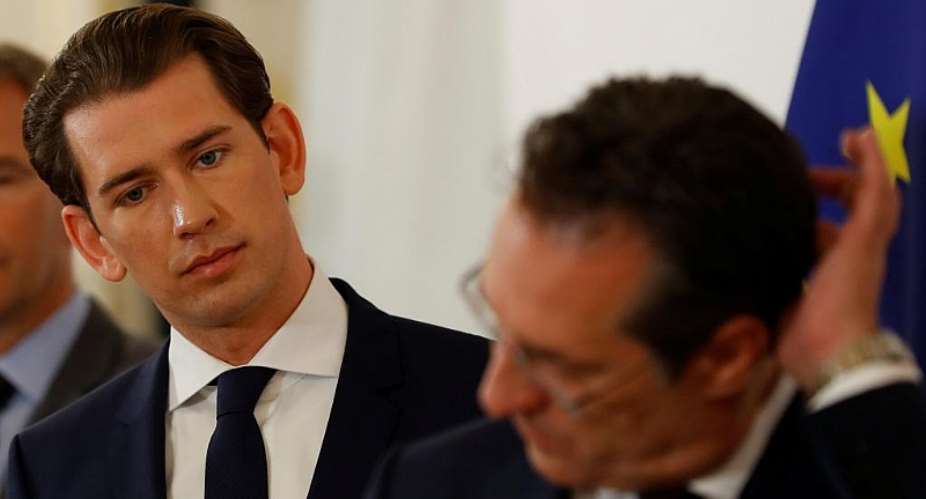Austria's parliament has voted no confidence in Chancellor Sebastian Kurz, with his party's surprising victory in European elections not enough to shake off a corruption scandal that broke his coalition government.
The scandal caused the collapse of the ruling coalition between Kurz's centre-right People's Party (OeVP) and the far-right Freedom Party (FPOe).
Just over a week ago, a video was released showing FPOe leader Heinz-Christian Strache offering public contracts in return for campaign help from a fake Russian backer.
Kurz gone, now what?
With Kurz's cabinet forced out, a caretaker government will now take over until snap elections in September.
“A technical cabinet, probably consisting of high-ranking civil servants will proceed until the election,” explains Wolfgang Müller, professor of political science at the department of Government at the University of Vienna.
The caretaker government would have to be neutral, neither left nor right, explains Paul Schmidt, the director of the Austrian Society for European Politics in Vienna.
But that's where it becomes tricky: “Administrating the next couple of months makes it very difficult to act politically on an EU level for example, in a very decisive situation,” says Schmidt.
Impact of a no-confidence vote
Austria has had no-confidence votes before. But this is different: "It's the first time in many decades that the centre-right will not be in government. It will be an important event for them,” explains Marcus Wagner, political scientist at the University of Vienna.
The far-right party of Strache and the centre-right party of Kurz had been working together up until the scandal went public.
“They had been working together harmoniously," says Wagner. "Prior to then, there were some incidents and some small arguments, but basically they tried to give an image of close cooperation and harmonious relationship."
But the scandal revealed “a real animosity between the two right-wing parties” which culminated in the no-confidence vote.
Right holding steady
Although the right didn't fare as well as expected in the European parliamentary elections, they did better than previous years.
The scandal has been damaging for the right in government, but it hasn't really hurt at the EU level – indeed, the disgraced FPOe ex-leader Strache even won the right to take a seat in Strasbourg, according to provisional results published Monday.
Despite the setback, Kurz finds himself in a strong position to profit from the autumn snap elections. With the OeVP's record success in the EU elections, Kurz will be hoping that voters will hand him a strong personal mandate in the autumn, which will leave him less beholden to the far-right.
Greener pastures?
The key issue that brought Kurz to power was the security card he played during the 2015 migrant crisis, which saw huge numbers of refugees and migrants entering the EU.
“This is one of the results of this wave of migration. Security became one of the number one issues,” explains Schmidt.
But there was also Kurz's charisma: “He's young, he's handsome, successful. He has a nice political discourse – and at the same time he is very patriotic.
"His approach of 'Austria first' appealed to the people, at a time where migration was on the top of the agenda, with Austria one of the main recipient countries of migrants and asylum seekers."
The migration issue has subsided significantly since 2015, with climate change coming to the fore as the burning issue during EU elections.





 Akufo-Addo commissions Phase II of Kaleo solar power plant
Akufo-Addo commissions Phase II of Kaleo solar power plant
 NDC panics over Bawumia’s visit to Pope Francis
NDC panics over Bawumia’s visit to Pope Francis
 EC blasts Mahama over “false” claims on recruitment of Returning Officers
EC blasts Mahama over “false” claims on recruitment of Returning Officers
 Lands Minister gives ultimatum to Future Global Resources to revamp Prestea/Bogo...
Lands Minister gives ultimatum to Future Global Resources to revamp Prestea/Bogo...
 Wa Naa appeals to Akufo-Addo to audit state lands in Wa
Wa Naa appeals to Akufo-Addo to audit state lands in Wa
 Prof Opoku-Agyemang misunderstood Bawumia’s ‘driver mate’ analogy – Miracles Abo...
Prof Opoku-Agyemang misunderstood Bawumia’s ‘driver mate’ analogy – Miracles Abo...
 EU confident Ghana will not sign Anti-LGBTQI Bill
EU confident Ghana will not sign Anti-LGBTQI Bill
 Suspend implementation of Planting for Food and Jobs for 2024 - Stakeholders
Suspend implementation of Planting for Food and Jobs for 2024 - Stakeholders
 Tema West Municipal Assembly gets Ghana's First Female Aircraft Marshaller as ne...
Tema West Municipal Assembly gets Ghana's First Female Aircraft Marshaller as ne...
 Dumsor is affecting us double, release timetable – Disability Federation to ECG
Dumsor is affecting us double, release timetable – Disability Federation to ECG
